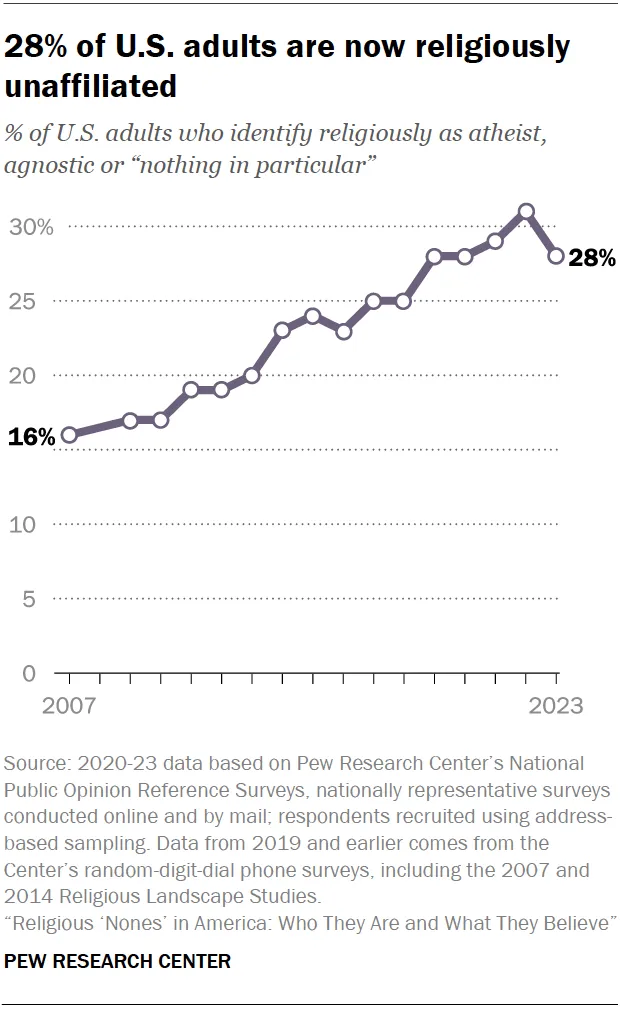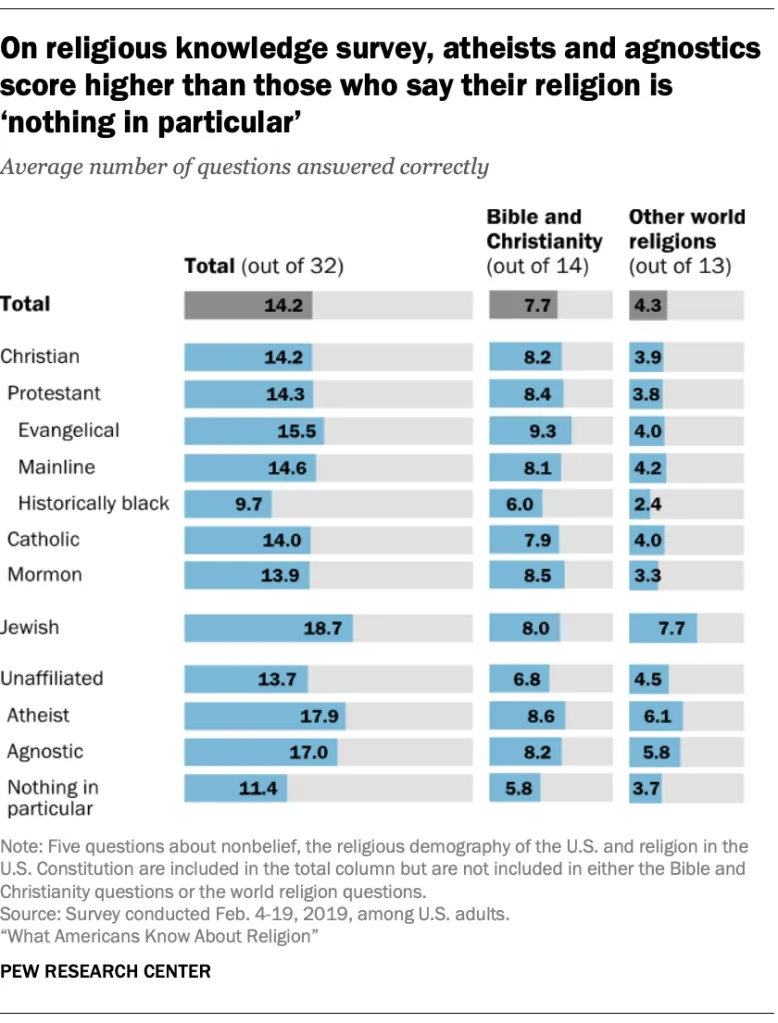8 facts about atheists | Pew Research Center
Atheism is the lack of belief in the existence of any god or gods, nothing more and nothing less. This position is based on the self-evidence fac that the only intellectually honest basis for belief is evidence and the equally self-evidence fact that there is not (and cannot be) any definitive evidence for the existence of anything supernatural because, by definition, nothing supernatural can be detected. All there is, is the material universe and anything beyond that has nowhere and no time to exist in and could not interact with or influence events in the material universe, so is indistinguishable from nothing. Belief in anything supernatural is thus a superstition for which there is no supporting evidence.
Atheism is a belief position, not a knowledge claim. Since again the only intellectually honest position is that all knowledge has a degree of uncertainty, atheism is not Agnosticism since Agnosticism allows for the possibility of Atheism being wrong, but any assessment of the probability of the existence of any god must be subjective since there can be no observations to base it on. So, an Agnostic cannot express that probability without it becoming a belief position. As it is, Agnosticism is a pedantic knowledge claim which has no measurable probability of being different to Atheism, in the accuracy of its claim.
Recently, the Pew Research Center published 8 facts about Atheism based on its opinion polling in the USA and elsewhere. Most of them refer to Atheism in the USA, where Atheists make up 4% of U.S. adults, according to their 2023 National Public Opinion Reference Survey. That compares with 3% who described themselves as atheists in 2014 and 2% who did so in 2007.
That figure of 4% for the USA lags someway behind the UK (12%), Netherlands (17%), Sweden (18%), France (23%) and even once staunchly Catholic countries of Spain (10%) and the Republic of Ireland where 14.2% gave Atheist/No religion, as their religion, (if any) in the 1922 census (an increase of 187% since 2011). However, with a great deal of stigma still attached to Atheism in the USA and pressure to conform with regular church attendance, the true figure for Atheism is probably very underestimated and hidden within the large and growing 'Nones, which currently stands at 28% in the USA.
Pew Research Center's eight fact about Atheism are:
- In the U.S., atheists are mostly men and are relatively young.
According to a Center survey conducted in summer 2023. Around six-in-ten U.S. atheists are men (64%). And seven-in-ten are ages 49 or younger, compared with about half of U.S. adults overall (52%).
Atheists also are more likely than the general public to be White (77% vs. 62%) and have a college degree (48% vs. 34%). Roughly eight-in-ten atheists identify with or lean toward the Democratic Party. - Almost all U.S. atheists (98%) say religion is not too or not at all important in their lives.
According to the same summer 2023 survey, an identical share say that they seldom or never pray.
At the same time, 79% of American atheists say they feel a deep sense of wonder about the universe at least several times a year. And 36% feel a deep sense of spiritual peace and well-being at least that often. - U.S. atheists and religiously affiliated Americans find meaning in their lives in some of the same ways.
In a 2017 survey, we asked an open-ended question about this. Like a majority of Americans, most atheists mentioned family as a source of meaning.
However, atheists (26%) were far more likely than Christians (10%) to describe their hobbies as meaningful or satisfying. Atheists were also more likely than Americans overall to describe finances and money, creative pursuits, travel, and leisure activities as meaningful. Very few atheists (4%) said they found life’s meaning in spirituality. - Atheists make up a larger share of the population in many Western European countries than in the U.S.
- Most U.S. atheists express concerns about the role religion plays in society.
An overwhelming majority of atheists (94%) say that the statement “religion causes division and intolerance” describes their views a great deal or a fair amount, according to our summer 2023 survey. And 91% say the same about the statement “religion encourages superstition and illogical thinking.” Nearly three-quarters (73%) say religion does more harm than good in American society. - Atheists may not believe religious teachings, but they are quite informed about religion
In our 2019 religious knowledge survey, atheists were among the best-performing groups. On average, they answered about 18 out of 32 fact-based questions correctly, while U.S. adults overall got roughly 14 questions right. In particular, atheists were twice as likely as Americans overall to know that the U.S. Constitution says no religious test is necessary to hold public office.
Atheists were also at least as knowledgeable as Christians on Christianity-related questions. For example, roughly eight-in-ten in both groups knew that Easter commemorates the resurrection of Jesus. - Most Americans don’t think believing in God is necessary to be a good person.
According to the summer 2023 survey. When we asked people which statement came closer to their views, 73% selected “it is possible to be moral and have good values without believing in God,” while 25% picked “it is necessary to believe in God in order to be moral and have good values.”
Adults in some other wealthy countries tend to agree with this sentiment, based on responses to a similar question we asked in 2019 and 2022. For example, nine-in-ten Swedish adults say belief in God is not necessary to be moral and have good values, while 85% in Australia, 80% in the Czech Republic and 77% in France say this.
However, fewer than one-in-ten adults in some other countries surveyed say that a person can be moral without believing in God. That includes 5% of adults in Kenya, 4% in the Philippines and 2% in Indonesia. In all three nations, more than nine-in-ten say instead that a person must believe in God to be a moral person. - About three-quarters of U.S. atheists (77%) do not believe in God or a higher power or in a spiritual force of any kind.
According to our summer 2023 survey. At the same time, 23% say they do believe in a higher power of some kind, though fewer than 1% of U.S. atheists say they believe in “God as described in the Bible.”
This shows that not all self-described atheists fit the literal definition of “atheist,” which is “a person who does not believe in the existence of a god or any gods,” according to Merriam-Webster.
The connection between Atheism and education on the one hand and Atheism and morality on the other can be gauged from the fact that if all Atheists were expelled from the USA, as some far-right Christo-fascist white nationalist groups advocate, America would lose 93% of its scientists and less than 1% of its prison population. The most religious country of the developed economies has by far the highest per capital homicide rate and by far the highest per capita prison population and is increasingly divided into intolerant hate groups, usually with religion providing the excuse.
What Makes You So Special? From The Big Bang To You
How did you come to be here, now? This books takes you from the Big Bang to the evolution of modern humans and the history of human cultures, showing that science is an adventure of discovery and a source of limitless wonder, giving us richer and more rewarding appreciation of the phenomenal privilege of merely being alive and able to begin to understand it all.
Available in Hardcover, Paperback or ebook for Kindle
Ten Reasons To Lose Faith: And Why You Are Better Off Without It
This book explains why faith is a fallacy and serves no useful purpose other than providing an excuse for pretending to know things that are unknown. It also explains how losing faith liberates former sufferers from fear, delusion and the control of others, freeing them to see the world in a different light, to recognise the injustices that religions cause and to accept people for who they are, not which group they happened to be born in. A society based on atheist, Humanist principles would be a less divided, more inclusive, more peaceful society and one more appreciative of the one opportunity that life gives us to enjoy and wonder at the world we live in.
Available in Hardcover, Paperback or ebook for Kindle


















No comments :
Post a Comment
Obscene, threatening or obnoxious messages, preaching, abuse and spam will be removed, as will anything by known Internet trolls and stalkers, by known sock-puppet accounts and anything not connected with the post,
A claim made without evidence can be dismissed without evidence. Remember: your opinion is not an established fact unless corroborated.